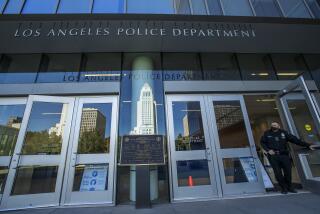Math Teaching Plan Combines Methods
- Share via
A tense battle over a proposed overhaul of math instruction in the Los Angeles Unified School District would be defused, at least for now, under recommendations that have been prepared for the school board.
A committee of teachers, administrators and outside consultants has been wrestling with the math issue since last fall. That process thrust the district into a nationwide debate over traditional teaching methods that focus on drills and “reform” methods that emphasize “hands-on” experience. And it led one of the participants in the process, Guillermo Mendieta, a consultant who helps teachers with nontraditional math lessons, to threaten to go on a hunger strike, beginning today.
On Friday, Mendieta said that he was confident his terms would be met and that he had canceled the hunger strike. “I’m very, very, very, very pleased and relieved,” he said.
But Robert Collins, the district administrator who presided over the sometimes heated math discussion, said the suggestions that will be sent to the Board of Education next month do not represent a victory for either side in the debate but will call for using elements of both methods.
The state established standards in 1997 for what all students should know in all grades. But textbooks designed with those standards in mind will not be ready until next year.
Collins said he will recommend to the board that schools not purchase math books until the new versions are available and approved by the state.
The publishers of programs oriented toward “hands-on” activities that are among the most popular in the district do not plan to try to win approval in the next round of textbook purchases. That means that math lessons will have to include traditional approaches.
Collins said the district’s current math program is disjointed and confusing for students, parents and teachers.
“We have kids going from first to third to fifth grade who go from reform to traditional to reform and then go into a reform middle school and a traditional high school,” Collins said.
Under the recommendation, committees would choose a single set of textbooks to be used by all schools.
Collins said this will “provide a process to develop a math program that we think will provide both reform and traditional approaches.”
More to Read
Sign up for Essential California
The most important California stories and recommendations in your inbox every morning.
You may occasionally receive promotional content from the Los Angeles Times.













